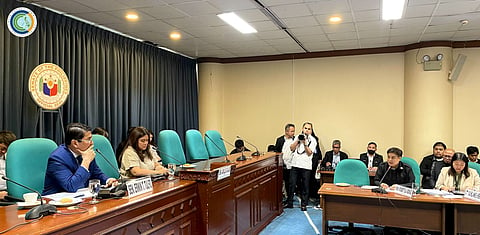
- NEWS
- the EDIT
- COMMENTARY
- BUSINESS
- LIFE
- SHOW
- ACTION
- GLOBAL GOALS
- SNAPS
- DYARYO TIRADA
- MORE

The Climate Change Commission (CCC) underscored the urgent need for decisive climate action, revealing the severe economic and environmental toll caused by extreme weather events.
CCC Vice Chairperson and Executive Director Robert E.A. Borje stressed the urgency of addressing the global climate crisis and its compounding effects on the Philippines.
“Between 2011 and 2021, tropical cyclones inflicted P673 billion in damages,” Borje reported.
He warned that by 2030, the country could face P83 billion in infrastructure losses and P466 billion in productivity losses due to extreme heat, compounded by rising sea levels.
In a recent briefing by the Senate Committee on Environment, Natural Resources, and Climate Change, Borje discussed environmental issues and the implementation challenges of ecological laws.
Citing Climate Impacts Tracker Asia, panel chairperson Senator Camille Villar highlighted the growing threat of flash floods and the escalating problem of plastic pollution, pointing to the Philippines’ status as home to seven of the world’s top 10 plastic-polluting rivers.
She noted, > “billions of single-use plastics and sachets end up in our landfills, rivers, and oceans every year, driven by our culture of affordable, small packaging.”
Villar also emphasized the need for improved enforcement of the Ecological Solid Waste Management Act (RA 9003), enacted two decades ago to address waste, but still facing obstacles in localized implementation.
“The challenge now is harmonizing its implementation to ensure that local government units and the private sector collaborate effectively,” she said.
Meanwhile, panel vice chairperson Senator Erwin Tulfo echoed concerns about flood control, stressing the necessity for science-based, long-lasting solutions as typhoons grow stronger and rainfall intensifies.
The CCC stressed the importance of systems thinking—a comprehensive, interdisciplinary approach—to tackle the multifaceted nature of climate impacts.
Borje explained, > “Flooding brought by intense rains and strong tropical cyclones is a complex problem shaped by multiple factors over time.”
“That’s why we approach this issue using systems thinking, integrating expertise across sectors such as agriculture, energy, and transportation,” he added.
Borje noted that a collaborative and data-driven approach allows anticipation of future risks and the careful design of policies and projects that remain robust under multiple scenarios.
“Addressing climate impacts requires a whole-of-nation effort, where different agencies and experts work together to develop solutions that can withstand the effects of climate change,” he added.
Central to these efforts is the National Adaptation Plan (NAP), developed in 2024 under President Ferdinand Marcos Jr.'s leadership.
The NAP aims to guide tailored strategies for communities based on their unique vulnerabilities, with a goal to reduce climate-related losses and build resilience toward sustainable development by 2050.
The Department of Environment and Natural Resources (DENR) also provided updates on law enforcement during the briefing, underscoring ongoing environmental management efforts.
